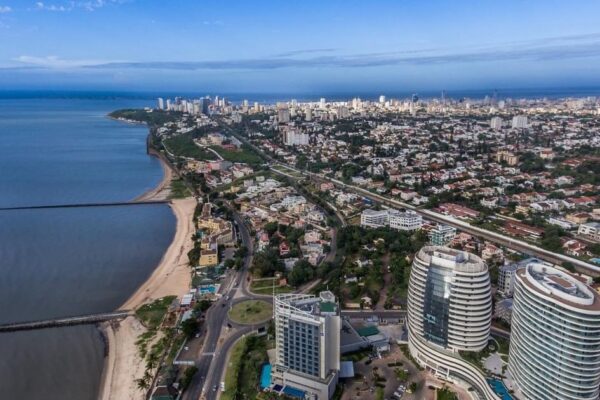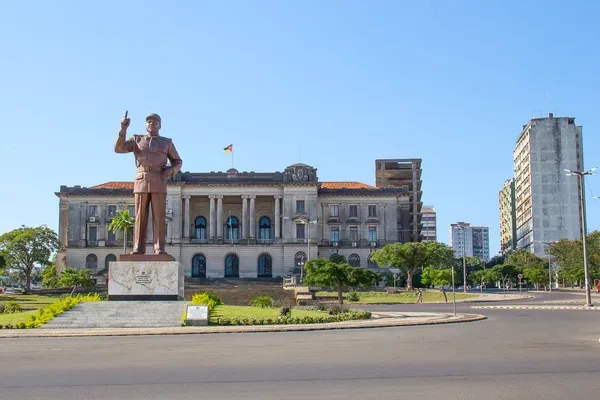Maputo City: Mozambique Facts, Map, History And Population
Maputo City Overview
Maputo is a city with culture, history, and coastal charm, offering visitors a mix of relaxation and adventure. Stroll through the historic Maputo Railway Station, designed by Gustave Eiffel, or visit the Fortress of Maputo to explore Mozambique’s colonial past. Art lovers can admire contemporary African masterpieces at the National Art Museum, while foodies indulge in fresh seafood, especially the famous peri-peri prawns, at the city’s vibrant markets and beachfront restaurants. For a cultural experience, the FEIMA Craft Market is the perfect place to shop for handcrafted souvenirs and immerse yourself in local artistry.
In addition to taking a boat trip to Inhaca Island, a snorkeling, diving, and dolphin-spotting paradise, outdoor enthusiasts can relax along the picturesque Avenida Marginal, a coastal promenade dotted with palm trees and offering views of the ocean. Maputo has a vibrant nightlife for nightlife lovers, with rooftop lounges, Afro-jazz clubs, and live music venues that harness the electrifying spirit of the city. A memorable trip full of adventure and culture awaits you in Maputo, whether you choose to explore historical sites, savor regional cuisine, or unwind by the Indian Ocean.
Maputo City Facts
Explore Maputo City: Mozambique’s Dynamic Capital! A bustling port city along the Indian Ocean, Maputo is known for its rich history, vibrant culture, and stunning coastal views. Once called Lourenço Marques, it showcases a unique blend of Portuguese colonial architecture, modern skyscrapers, and lively street markets. Home to over 1.1 million people, Maputo thrives on trade, tourism, and seafood, especially its famous peri-peri prawns. Must-visit landmarks include the Maputo Railway Station, the Fortress of Maputo, and the scenic Avenida Marginal. With a warm tropical climate and a buzzing nightlife, Maputo offers an exciting mix of history, adventure, and relaxation, making it a must-visit African city!

The Rich History of Maputo City
Maputo, the vibrant capital of Mozambique, has a fascinating history shaped by trade, colonialism, and cultural fusion. Originally a small fishing village, the area was first explored by Portuguese traders in the 16th century. By the late 18th century, it became an important trade hub under Portuguese control and was named Lourenço Marques after the explorer who mapped the region. The city grew rapidly in the 19th and early 20th centuries as a strategic port, exporting goods like ivory, gold, and rubber while also serving as a key railway link to South Africa. Portuguese colonial influence remains visible today in Maputo’s iconic architecture, including the Central Railway Station and the Iron House, designed by Gustave Eiffel.
Following Mozambique’s independence in 1975, Lourenço Marques was renamed Maputo, marking a new era of national identity. However, the country soon faced a brutal civil war (1977–1992) that affected its development. Since the war’s end, Maputo has transformed into a thriving metropolis, blending modern growth with rich cultural traditions. Today, the city is a symbol of resilience and progress, boasting a lively arts scene, historic sites, and a diverse culinary landscape. As the heartbeat of Mozambique, Maputo stands as a testament to its past while embracing a dynamic future.

Maputo City Population: A Vibrant Urban Hub
Maputo, the capital and largest city of Mozambique is home to a dynamic and diverse population of over 1.1 million people. As the country’s economic and cultural heart, the city attracts people from across Mozambique and beyond, leading to a rich mix of ethnic groups, languages, and traditions. Portuguese remains the official language, but locals also speak Shangaan, Ronga, and Swahili, reflecting the city’s deep African heritage. With a youthful and growing population, Maputo is a bustling metropolis where modern urban life meets traditional customs, seen in its lively markets, street music, and colorful festivals.
As a major port city along the Indian Ocean, Maputo continues to expand, drawing in workers, entrepreneurs, and tourists. The city’s rapid growth has led to urbanization challenges, including housing shortages and traffic congestion, but it remains a hub of opportunity. The economy thrives on trade, tourism, and services, supporting a diverse workforce from fishermen and artisans to business executives. Despite its challenges, Maputo’s people drive its energy, shaping a city known for its warmth, resilience, and vibrant culture.

Africa Beach Holiday Travel Advice
We are here to help you plan your dream African beach holidays with the Best Holiday Resorts And Vacation Experts. Whether you’re seeking luxury, adventure, or cultural immersion, Africa boasts some of the world’s most stunning beaches, offering pristine sands, crystal-clear waters, and vibrant marine life.
For personalized Affordable Luxury Beach Holidays, contact specialists in Affordable Luxury African Safaris. Tailor your itinerary to include exclusive beach retreats, local cultural tours, and exciting water adventures.